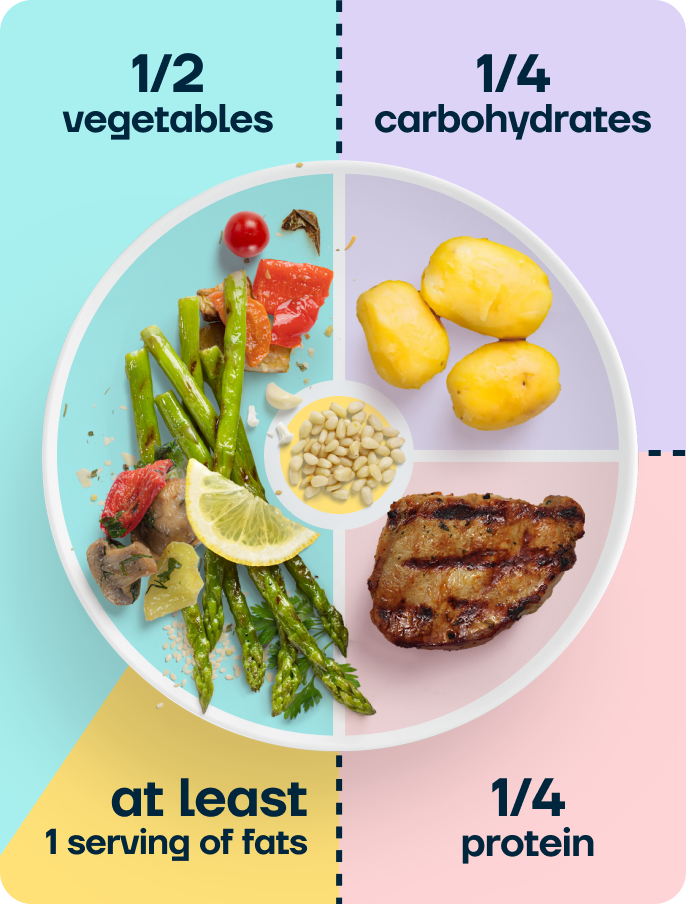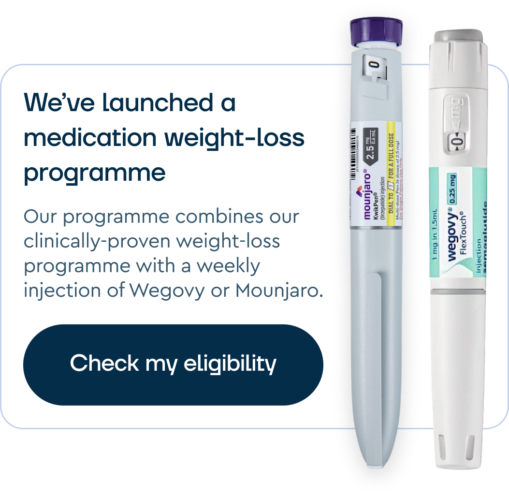Jump to: Ozempic isn’t a magic pill | 1) Be patient on Ozempic to see results | 2) Eat a diet based on whole foods on Ozempic | 3) Find other ways to soothe challenging emotions | Take home message
You might still be hungry on Ozempic because it takes time for your body to adjust to the medication, your current dose might be too low, and your current eating habits aren’t working alongside the medication.
Other factors like our psychological health, exercise, and sleep can also impact our hunger levels on Ozempic.
Ozempic (semaglutide) is a weight-loss injection that mimics the hormone GLP-1 to lower hunger and food-seeking behaviours.
However, everyone will respond differently to Ozempic; some might not notice the appetite-suppressing effects immediately.
Weight-loss injections aren’t a magic pill
Weight-loss injections like Ozempic are designed as additional tools for healthy lifestyle change and shouldn’t be considered lifelong medications.
Instead, they should be used to help you kickstart your weight-loss journey whilst you focus on building new, healthy habits.
Consider the use of antidepressants for people living with depression. They’re not designed to cure the condition. Instead, they’re designed to allow room for therapy to treat the condition’s underlying cause.
Ozempic, Mounjaro, and Wegovy are similar. These medications can help silence food-related thoughts and also give you a boost of confidence with more immediate weight-loss results.
This helps to buy you the time and headspace to understand why your body may have struggled to lose weight previously, and to build new long-term healthy habits.
The core focus of our medication programmes is to calm down the feeling of food noise, lower your cravings, and allow you to build healthier habits to keep the weight off for good.
The ultimate goal is to make losing weight feel second nature.
Second Nature’s medication-supported programmes
Second Nature has two medication-supported programmes: a Wegovy weight-loss programme and a Mounjaro weight-loss programme. Ozempic is no longer available in the UK for weight loss.
If you’ve made the decision to try Wegovy or Mounjaro (assuming you’re eligible), why should you choose Second Nature over other medication providers?
For peace of mind.
Second Nature has worked with the NHS for over 6 years, providing weight-loss programmes across the UK.
Whilst our Wegovy and Mounjaro weight-loss programmes are private and not currently used by the NHS, we’ve built the programmes focusing on scientific evidence, patient safety, and data security.
We hope that our 6+ years of working with the NHS and building a track record of trust and effective weight-loss results will give you peace of mind to give us a try.
Otherwise, if you’re currently on Ozempic and still feeling hungry, keep reading as we look at three ways to optimise your results.
1) Be patient on Ozempic to see the results
Our first recommendation to optimise your results on Ozempic is to be patient. Semaglutide, the drug in Ozempic, is a long-acting medication that’s started at a lower dose to reduce the number and severity of side effects as it’s built up to a higher maintenance dose.
Semaglutide can take 4-8 weeks to reach a level in the body we call a steady state. A steady state is when the drug’s levels in the body remain consistent rather than spiking and falling.
Based on data from randomised controlled trials, you can expect to lose up to 1.1% of your weight in a month on Ozempic. After two months on Ozempic, you could lose up to 2.2%.
Interestingly, this initial weight loss is no different from other weight loss treatments, nor is it the impact of diet interventions on weight loss. The real impact of semaglutide is seen beyond 3 months.
So, it can take up to 3 months before Ozempic supports greater weight loss than is typically seen with traditional interventions like diet and exercise without medications.
During these earlier stages on Ozempic, your hunger levels may still be higher than you’d like, which may rise and fall between meals.
However, if you’re able to persevere with Ozempic and make some positive changes to your diet and lifestyle, you’ll be able to achieve your weight loss goals in the long term.
After 3 months, you’ll be on the maximum dose of Ozempic at 1 mg, which is likely when you’ll experience the greatest reductions in hunger and appetite.
Key points
- Ozempic is a long-acting medication, and it can take up to 8 weeks before it reaches a steady state where hunger levels don’t rise and fall
- If you’re able to persevere during the early months on Ozempic and make positive changes to your diet and lifestyle, you’ll be able to reach your weight loss goals
2) Eat a diet based on whole foods while on Ozempic
Ultra-processed foods are digested much quicker than whole foods, bypassing the signals our gut releases to the brain to lower hunger and appetite.
Research shows that when we consume ultra-processed foods, the hormones that signal to the brain to lower hunger and make us feel full are much lower than when we eat whole foods.
The effect (or lack thereof) of ultra-processed foods on our appetite is why we recommend consuming a diet rich in whole foods while on Ozempic.
Here’s a list of food we recommend consuming while on Ozempic:
- High-quality protein sources: Fish, meat, eggs, tofu, tempeh, yoghurt, cheese, and seafood.
- Fat from whole foods: Meat, fish, eggs, dairy products (rich in calcium), nuts, seeds, avocado, and extra virgin olive oil.
- High-fibre complex carbohydrates: Whole grains like quinoa and brown rice, sweet potato, white potatoes, pumpkin, legumes like lentils, chickpeas, beans, and butternut squash.
- Fruits and vegetables: Take your pick, variety is key.
- Make water your drink of choice: Hunger signals can indicate insufficient water intake.

Here’s a list of foods we recommend limiting while you’re on Ozempic:
- Ultra-processed foods: Most boxed cereals, supermarket bread and pastries, fast food, microwave meals, oven pizza, crisps, biscuits, fizzy drinks, and supermarket sandwiches.
- Added sugar: Particularly from soft drinks
- Refined carbohydrates: White pasta, white rice, and oats that aren’t steel-cut
- Refined vegetable oils: Sunflower and vegetable
We also recommend eating three meals a day and including protein-rich snacks if necessary.
Having a consistent meal pattern can support the balance of our body’s hormone levels and help you feel fuller for longer.
Key points
- Choosing a diet based on whole foods is best while on Ozempic
- Eating too many ultra-processed foods can adversely affect our hunger levels and lead to excess calorie intake
- Eat three meals a day and enjoy protein-rich snacks if you need to
3) Find other ways to soothe challenging emotions
Our psychological health can influence our eating choices, and we may experience hunger or cravings for food beyond our physical requirements when stressed, lonely, or sad. This is commonly referred to as emotional eating.
Food provides us with great comfort, and research shows it lowers the intensity of challenging emotions and makes us feel better.
However, if we only use food to soothe ourselves during challenging times, it can adversely affect our health and hunger levels, as our brain will start associating these emotions with eating.
So, we must find alternative ways to soothe ourselves when feeling challenging emotions like stress, loneliness, or sadness.
Here are two things you can do to move away from emotional eating:
- Find acceptance: We’re always going to experience challenging emotions, and if we can accept them as part of our lives and daily mood changes, we’re more likely to move beyond them.
- Find alternative ways to soothe emotions: If we can find alternative behaviours or habits, known as ‘substitutions’, to soothe challenging emotions, we can move away from emotional eating. This might be taking a 5-minute walk, making herbal tea, or calling a friend.
Key points
- Our emotions can impact our hunger levels and make us crave food beyond our physical needs
- By finding acceptance and alternative ways to soothe emotions, we can move away from emotional eating
Take home message
Despite being a very effective medication to help lower hunger and support weight loss, we may still experience hunger on Ozempic, particularly in the early stages of taking the medication.
However, suppose we can be patient, follow the treatment plan, eat a healthy diet based on whole foods, and move away from emotional eating. In that case, we’ll give ourselves the best opportunity to maximise our results on Ozempic.


